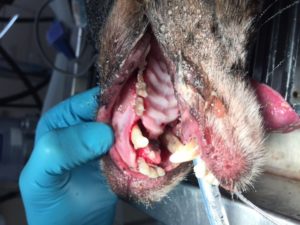An abscessed tooth is a condition that occurs when a formation of pus develops under or around your pet’s tooth. The condition can be extremely painful, and abscesses that are left untreated can lead to bacteria spreading throughout the body. This can cause serious health complications for your pet, so it is important to identify the condition early on so they can receive the correct treatment.
Causes of an Abscessed Tooth
An abscess is formed when bacteria enters the root or other sensitive areas of a tooth. This can happen when the tooth breaks, exposing the tissue beneath. Trauma to the teeth can occur as a result of chewing on hard objects such as bones, chew toys, or other items. An abscessed tooth may also be caused by periodontal disease (gum disease), an infection of the mouth that is often seen in older pets.
Symptoms of an Abscessed Tooth
In the early stages of the condition, symptoms of an abscessed tooth may be difficult to detect. If the condition is more serious, symptoms will generally be easier to identify. Please take your pet to the veterinarian for a checkup if you notice any of the following common signs and symptoms of an abscessed tooth.
- Bad breath
- Difficulty eating or chewing
- Pawing at the mouth
- Loss of appetite
- Broken tooth
- Loose teeth
- Swelling and redness in the mouth
- Swelling around the eye
- Bleeding gums
- Tooth discoloration
- Excessive drooling
Diagnosis of an Abscessed Tooth
Your veterinarian will perform an oral and dental examination of your pet. If an abscessed tooth is present, it will generally be very simple to diagnose. Depending on the results of the oral and dental examination, blood tests may be ordered to detect any underlying causes of your pet’s condition. Your veterinarian may also perform dental X-rays to check for signs of infection in the surrounding teeth and gums.
Treatment of an Abscessed Tooth
Treatment of an abscessed tooth will often require removal of the tooth to prevent the spread of infection. Alternatively, root canal treatment which allows the tooth to be saved may be a viable option.
Your veterinarian will prescribe medications such as antibiotics, anti-inflammatories, and pain relief medications to help clear up infection and aid your pet’s recovery. They may also suggest cold packs to reduce inflammation and a soft diet during recovery to minimize pain while eating. It’s important to closely follow your veterinarian’s instructions for home care to help your pet recover as quickly as possible.
Prevention of an Abscessed Tooth
The best way to minimize the risk of your pet developing an abscessed tooth is to practice good oral hygiene. Always use a toothbrush and toothpaste that’s designed for pets, and ask your veterinarian if you need any advice on maintaining your pet’s oral health.
It’s a good idea to limit your pet’s access to hard toys and treats that may damage their teeth. Finally, make sure to schedule regular dental checkups with your veterinarian to ensure that your pet’s teeth and gums stay healthy throughout their lifetime.


